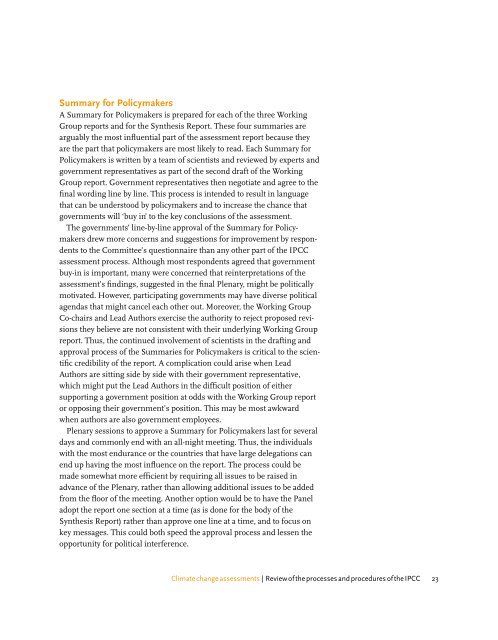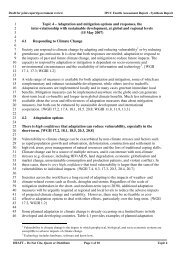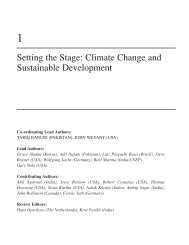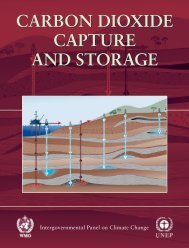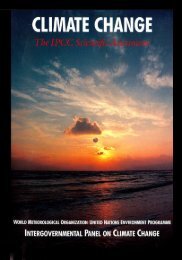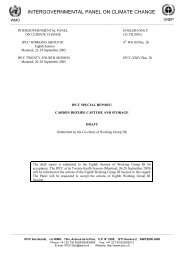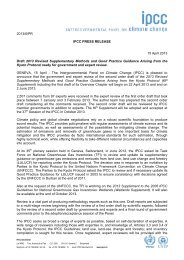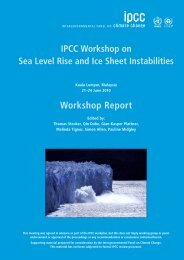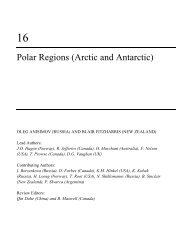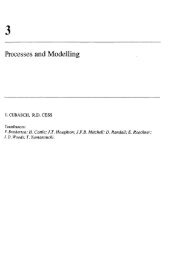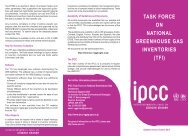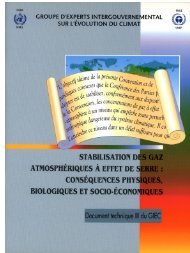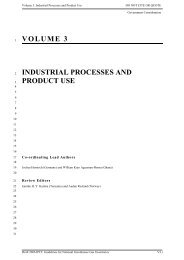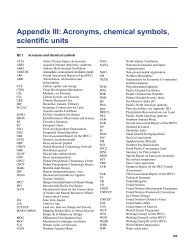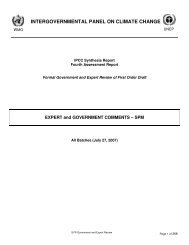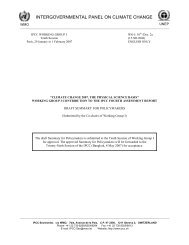Climate change assessments Review of the processes and ...
Climate change assessments Review of the processes and ...
Climate change assessments Review of the processes and ...
You also want an ePaper? Increase the reach of your titles
YUMPU automatically turns print PDFs into web optimized ePapers that Google loves.
Summary for Policymakers<br />
A Summary for Policymakers is prepared for each <strong>of</strong> <strong>the</strong> three Working<br />
Group reports <strong>and</strong> for <strong>the</strong> Syn<strong>the</strong>sis Report. These four summaries are<br />
arguably <strong>the</strong> most influential part <strong>of</strong> <strong>the</strong> assessment report because <strong>the</strong>y<br />
are <strong>the</strong> part that policymakers are most likely to read. Each Summary for<br />
Policymakers is written by a team <strong>of</strong> scientists <strong>and</strong> reviewed by experts <strong>and</strong><br />
government representatives as part <strong>of</strong> <strong>the</strong> second draft <strong>of</strong> <strong>the</strong> Working<br />
Group report. Government representatives <strong>the</strong>n negotiate <strong>and</strong> agree to <strong>the</strong><br />
final wording line by line. This process is intended to result in language<br />
that can be understood by policymakers <strong>and</strong> to increase <strong>the</strong> chance that<br />
governments will ‘buy in’ to <strong>the</strong> key conclusions <strong>of</strong> <strong>the</strong> assessment.<br />
The governments’ line-by-line approval <strong>of</strong> <strong>the</strong> Summary for Policymakers<br />
drew more concerns <strong>and</strong> suggestions for improvement by respondents<br />
to <strong>the</strong> Committee’s questionnaire than any o<strong>the</strong>r part <strong>of</strong> <strong>the</strong> IPCC<br />
assessment process. Although most respondents agreed that government<br />
buy-in is important, many were concerned that reinterpretations <strong>of</strong> <strong>the</strong><br />
assessment’s findings, suggested in <strong>the</strong> final Plenary, might be politically<br />
motivated. However, participating governments may have diverse political<br />
agendas that might cancel each o<strong>the</strong>r out. Moreover, <strong>the</strong> Working Group<br />
Co-chairs <strong>and</strong> Lead Authors exercise <strong>the</strong> authority to reject proposed revisions<br />
<strong>the</strong>y believe are not consistent with <strong>the</strong>ir underlying Working Group<br />
report. Thus, <strong>the</strong> continued involvement <strong>of</strong> scientists in <strong>the</strong> drafting <strong>and</strong><br />
approval process <strong>of</strong> <strong>the</strong> Summaries for Policymakers is critical to <strong>the</strong> scientific<br />
credibility <strong>of</strong> <strong>the</strong> report. A complication could arise when Lead<br />
Authors are sitting side by side with <strong>the</strong>ir government representative,<br />
which might put <strong>the</strong> Lead Authors in <strong>the</strong> difficult position <strong>of</strong> ei<strong>the</strong>r<br />
supporting a government position at odds with <strong>the</strong> Working Group report<br />
or opposing <strong>the</strong>ir government’s position. This may be most awkward<br />
when authors are also government employees.<br />
Plenary sessions to approve a Summary for Policymakers last for several<br />
days <strong>and</strong> commonly end with an all-night meeting. Thus, <strong>the</strong> individuals<br />
with <strong>the</strong> most endurance or <strong>the</strong> countries that have large delegations can<br />
end up having <strong>the</strong> most influence on <strong>the</strong> report. The process could be<br />
made somewhat more efficient by requiring all issues to be raised in<br />
advance <strong>of</strong> <strong>the</strong> Plenary, ra<strong>the</strong>r than allowing additional issues to be added<br />
from <strong>the</strong> floor <strong>of</strong> <strong>the</strong> meeting. Ano<strong>the</strong>r option would be to have <strong>the</strong> Panel<br />
adopt <strong>the</strong> report one section at a time (as is done for <strong>the</strong> body <strong>of</strong> <strong>the</strong><br />
Syn<strong>the</strong>sis Report) ra<strong>the</strong>r than approve one line at a time, <strong>and</strong> to focus on<br />
key messages. This could both speed <strong>the</strong> approval process <strong>and</strong> lessen <strong>the</strong><br />
opportunity for political interference.<br />
<strong>Climate</strong> <strong>change</strong> <strong>assessments</strong> | <strong>Review</strong> <strong>of</strong> <strong>the</strong> <strong>processes</strong> <strong>and</strong> procedures <strong>of</strong> <strong>the</strong> IPCC 23


